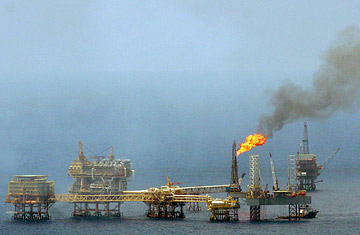
A Petroleos Mexicanos (PEMEX) oil rig in the Gulf of Mexico, near the shores of the state of Campeche, Mexico.
Angelic children stare at rolling waves as a deep voice booms out the wonders of petroleum. "Mexico has a great treasure, a treasure hidden below the bottom of the sea," the narrator says soothingly above joyous music. "But the world now confronts a new reality." Suddenly, the watcher is bombarded with graphics explaining deep sea drilling in terms fifth graders might understand; the oil is at a depth 30 times greater than Mexico's highest building; the pressure is like 60 trucks weighing on a can of soda. As the music reaches a dramatic finale, the narrator hits the punch line as if in a preview for a blockbuster movie: "Reaching our oil is one of the biggest challenges of our time," he says. "And Mexico has to take the necessary actions to achieve it."
That five-minute spot being beamed out night after night on prime time TV is part of a campaign by President Felipe Calderon to sell foreigners a piece of Mexico's most sacred cow: the state-owned oil monopoly. Tuesday marks 70 years since the country nationalized its oil fields that were drilled by U.S. and British companies, but Calderon wants to bring back foreign oil companies by allowing some private investment in the industry. And his proposal has sparked a debate whose pitch nears hysteria on all sides of the political spectrum: Conservatives scream that Mexico's economy will collapse unless it takes action; while rabble-rousing leftists warn that a corrupt government wants to sell the nation's patrimony to the gringos.
Clearly, the stakes are high. Petroleos Mexicanos, or Pemex, provides Mexico with 40% of its federal budget. It also provides the United States with its fourth-biggest source of oil imports, after Canada, Saudi Arabia and Venezuela, shipping it 1.2 million barrels per day.
Calderon, echoing the concern of most industry analysts, warns that Pemex is suffering from underinvestment and mismanagement. Its output is declining each year by about 200,000 barrels per day, and if the present trend continues, Mexico will be importing petroleum within nine years. The nation has vast deep-water reserves in the northern Gulf of Mexico — more than 50 billion barrels' worth by some estimates. But the administration argues that Mexico lacks the capital and technology to drill those reserves.
"We must go after that oil," Calderon told reporters last month. "It's a problem of technology and operational capacity."
To allow international oil companies to invest in the Gulf would mean changing Mexico's Constitution, which requires that the country's oil industry remain closed to both foreign and private ownership. Calderon has promised to send an energy reform bill to Congress before the current session ends in April. While guarding the exact details of that reform, the President and his deputies have argued publicly that more foreign involvement is crucial.
Opponents argue that any foreign incursion equals privatization. Mexicans can take care of their own oil industry, they say, and the predictions of doom are exaggerated. Led by the fiery leftist Andres Manuel Lopez Obrador, who lost the 2006 presidential election to Calderon by less than 1%, they evoke emotional calls to defend the Mexican nation and its resources. The nationalization of oil in 1938 was a symbol of Mexico's independence from foreign powers, and was celebrated in huge street parties. Lopez Obrador has called his supporters to Mexico's central plaza on the expropriation anniversary this Tuesday, to kick-start a campaign against the reform.
The President's position has been further complicated by a scandal involving Pemex and his chief deputy. Opponents accuse Interior Secretary Juan Camilo Mourino of steering lucrative Pemex contracts to his family trucking business when he was assistant secretary of energy under Calderon in 2003. The son of a Spanish oil man, Mourino admits he signed the contracts but says he broke no laws by doing so. However, the deals are being investigated by federal attorneys and a congressional committee and have made daily front pages in the Mexican press.
"This is an example of how the mafia controlling Mexico want to steal the oil money," charged Rep. Alejandro Sanchez of Lopez Obrador's leftist Democratic Revolution Party. "Just imagine the kickbacks if these officials were making billion-dollar deals with Exxon."
However, lawmakers in Calderon's conservative National Action Party believe they are in a strong enough position to get an energy reform through Congress. In alliance with the former ruling Institutional Revolutionary Party, or PRI, the President's party has passed financial, social security and justice reforms despite cries of protest.
The leftist opposition is on the ropes after its 2006 election defeat, government supporters say, and is grasping at the oil issue to regain momentum. An internal leadership contest in Lopez Obrador's party on Sunday was marred by infighting, with militants physically attacking a senator from a rival faction.
"They haven't even seen Calderon's energy bill and they are protesting," said National Action Rep. Jorge Nordhausen, a secretary on the energy committee. "They don't care about passing laws. They don't even care about oil. They just want a new flag to fight for so they can cause problems."
